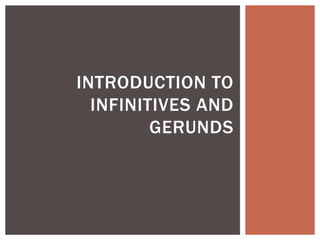
Introduction to infinitives and gerunds
- 1. INTRODUCTION TO INFINITIVES AND GERUNDS
- 2. THE INFINTIVE IS “TO” For example: THE BASE FORM, OR to go DICTIONARY FORM OF to be to study THE VERB: to think
- 3. For THE GERUND IS THE example: going BASE FORM OF THE being VERB + “-ING”: studying thinking
- 4. A GERUND IS A KIND OF NOUN. IT CAN OFTEN BE THE SUBJECT OF A SENTENCE: For example: Fishing is my favorite thing to do on the weekend. Learning English is hard. Working in the hot sun is always exhausting.
- 5. AN INFINITIVE CAN SOMETIMES BE THE SUBJECT OF A SENTENCE, BUT THIS IS FORMAL AND OLD FASHIONED: For example: To err is human. (This an old proverb meaning that it is natural for people to make mistake.) To be or not to be is the question. (Famous line from Shakespeare’s play Hamlet.)
- 6. NOTICE THE NEGATIVE FORMS OF A GERUND OR INFINITIVE: For example: To be or not to be is the question. Not using your seat belt is dangerous.
- 7. A GERUND CAN BE THE OBJECT OF A PREPOSITION, BUT AN INFINITIVE CANNOT: For example: We are thinking about going to San Francisco this weekend. Last night I went out with friends instead of studying.
- 8. BOTH A GERUND AND AN INFINITIVE CAN BE THE OBJECT OF A VERB: For example: I don’t like to drive on the freeway. I don’t like driving on the freeway.
- 9. BUT THE RULES FOR GERUNDS AND INFINITIVES AS OBJECTS ARE COMPLICATED AND DIFFICULT.
- 10. THE GOOD NEWS IS THAT WHEN YOU MAKE MISTAKES WITH INFINITIVES AND GERUNDS AFTER A VERB, EVERYBODY KNOWS WHAT YOU MEAN—YOU JUST SOUND A BIT FOREIGN.
- 11. WE WILL WORK ON GERUNDS AND INFINTIVES LITTLE BY LITTLE. For now, study these links on the Moodle site: Slide Show: Gerunds and Infinitives After Verbs Online Grammar Handout: Gerunds and Infinitives After Verbs
